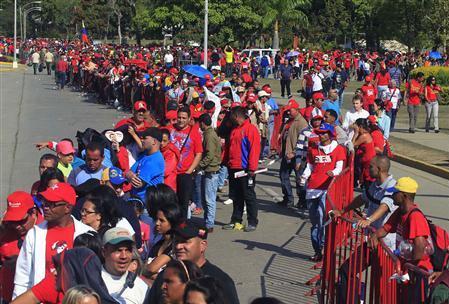CARACAS, (Reuters) – Saluting, clenching fists and making the Roman Catholic sign of the cross over Hugo Chavez’s open casket, Venezuelans crowded today to see their deceased leader one last time and pledge that his socialist revolution will not die.
Tens of thousands of grieving supporters stood in lines that snaked around a grandiose military academy in an mass show of respect for Chavez, who died on Tuesday at age 58 after a two-year battle with cancer.

REUTERS/Edwin Montilva
From soldiers in fatigues to officers in ceremonial dress, senior ministers to residents of the slums where Chavez was most loved, those in line vowed to defend his legacy and back his preferred heir, acting President Nicolas Maduro, in a new vote.
“We want to see the president, we want to be there for his last moments,” said Trinidad Nunez, 40, outside the building where Chavez’s body will lie in state until an official funeral on Friday.
“It is up to us to carry on the revolution and do what Chavez asked us to do: support Maduro.”
Chavez was dressed in an army uniform and a signature red beret like the one he wore in a 1992 speech to the nation that launched his political career after he led a failed coup.
One government source told Reuters that Chavez entered a coma on Monday and died the next day of respiratory failure after a rapid deterioration from the weekend when he had held a lengthy meeting with ministers at his bedside.
The cancer had spread to his lungs, the source added.
MADURO VERSUS CAPRILES VOTE LOOMS
There is uncertainty over exactly when a presidential vote will be held in the OPEC country with the world’s largest oil reserves.
Though the constitution stipulates a poll must be held within 30 days, politicians say election authorities may not be ready in time and there is talk of a possible delay. Chavez ruled for 14 years, winning four presidential elections.
Maduro, 50, a former union leader who ended his education at high school before plunging into politics, looks certain to face opposition leader Henrique Capriles, 40, the centrist governor of Miranda state who lost to Chavez in last year’s election.
Opposition sources told Reuters on Wednesday they have agreed to again back Capriles, whose 44 percent vote share in 2012 was the best performance by any candidate against Chavez.
One recent opinion poll gave Maduro a strong lead, and both international markets and foreign diplomats are factoring in a probable win for him, meaning a continuation of ‘Chavista’ policies at least in the short term.
The tall and hefty Maduro, who lacks Chavez’s rhetorical zeal, was his foreign minister for six years before being named vice president in late 2012.
He has pledged to adhere to Chavez’s brand of ferociously nationalist politics and controversial economic policies that included regular seizures of private businesses as well as wildly popular social welfare programs.
Some analysts believe that Maduro might eventually try to ease tensions with Western investors and the U.S. government. But just hours before Chavez’s death, he was accusing “imperialist” enemies of infecting the president with cancer and he expelled two American diplomats for alleged conspiracies.
Maduro may have to step down from his role as caretaker president to launch his candidacy. One official source told Reuters that Chavez’s nephew, Science Minister Jorge Arreaza, might step into that role.
Capriles, an athletic career politician and lawyer from a wealthy family, wants Venezuela to follow Brazil’s softer center-left model.
BURIAL PLANS
The government still has not announced where Chavez will be buried. Many Venezuelans assume he will be laid to rest in his rural home town of Sabaneta in the heart of the “llanos” where he was born in a house with a dirt floor.
Some supporters, though, want him buried in a grand mausoleum Chavez ordered built in Caracas for the remains of 19th century independence hero Simon Bolivar, his hero.
State media have been airing old Chavez speeches and songs over and over. Opposition supporters have kept a low profile, most simply expressing condolences but some privately exulting at the demise of a man they viewed as a dictator who trampled on opponents and ruined their economy.
At the wake, Venezuelans strained for a glimpse of Chavez, many welling up in tears as they reached his open casket.
“I told him ‘don’t worry, Nicolas Maduro will be the new president as you asked’,” said nurse Maria Fernandez, 51, after filing past the coffin.
Grief was raw in Cuba, too, where Chavez had close relations with past and present leaders Fidel and Raul Castro.
Subsidized oil supplies begun under Chavez helped keep the communist-run island’s economy afloat, while more than 40,000 Cubans work in Venezuela in health clinics, sports programs, the military and government ministries.
“I could not control the tears,” said one Cuban woman, Omara Lahera, paying tribute at a large photo of Chavez in Havana’s Revolution Square. “His death took us by surprise. He always lived in our hearts.”
Some of Chavez’s closest allies are already in Caracas to join the mourning, including the presidents of Bolivia, Uruguay and Argentina.
“He helped all the people of Latin America, he fought for integration and he is part of our history,” Argentine leader Cristina Fernandez said.





